By JULIE MINDA
Four Catholic health systems are among 10 organizations that last month helped formally launch a not-for-profit company with a mission to normalize the pricing and availability of generic drugs.
Using $100 million in startup capital from these 10 governing members, the company will produce new supplies of lifesaving pharmaceuticals as early as next year to counter the problem of arbitrary and manipulated shortages and egregious price hikes in the generics market that threaten patient safety, according to executives and member representatives of the new company. More than 120 organizations — accounting for about one-third of U.S. hospitals — have committed to participate in the new company, or expressed interest in doing so, according to a company press release.
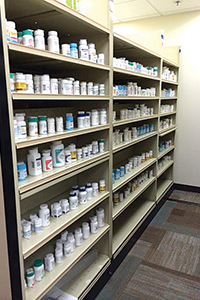
The pharmacy at Providence Seaside Hospital in Seaside, Ore. The hospital is part of Providence St. Joseph Health, which is one of the organizations partnering on a new generic drug company.
Initially announced in January, the company now has a name — Civica Rx — and is registered as a nonstock corporation in Delaware. Civica Rx's headquarters will be in the Salt Lake City area. Martin VanTrieste, a former chief quality officer for pharmaceutical giant Amgen, has come out of retirement to work on a pro bono basis as Civica Rx chief executive.
VanTrieste, who has 35 years' experience in the pharmaceutical and health care industries, told Catholic Health World: "No family member or parent should ever have to worry about where the cancer medication's coming from and will it be there on time to treat their child."
Social welfare
Dan Liljenquist is chief strategy officer for Intermountain Healthcare, a Civica Rx governing member. He came up with the idea for the generic drug collaborative several years ago and developed it. He chairs the new company's governing board.
Liljenquist said Civica Rx will function as a social welfare organization in which there are no ownership stakes, every member receives the exact same per unit price regardless of the member's size, every member gets a "fair share" of the drug supply produced (each member will receive an allocation based on their stated need, and no member will be able to purchase product allocated for another). Every member signs the exact same contract — there are no special deals or rebates.
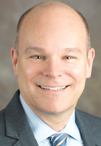
Frost

Dredge
"The goal is to improve access and pricing for the entire health care landscape," not just members, said Craig Frost, system vice president of pharmacy operations for Catholic Health Initiatives, a governing member of Civica Rx.
Carter Dredge is chief transformation officer of Civica Rx governing member SSM Health. He said Civica Rx's model of shared benefit for all aligns perfectly with shared principles of the Catholic health mission, including the prioritizing of the common good, and protection of the poor and vulnerable.
Member benefits
There are three levels of membership in Civica Rx. Governing members oversee the organization, and each gets a seat on the board. Founding members get input on the prioritization of drugs for manufacturing by virtue of their participation on two committees advising the board. Participating members can contract to purchase drugs from Civica Rx.

Liljenquist
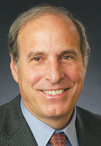
Hochman
Civica Rx still can accept accept governing and founding members, with board approval — the company can have up to 12 governing members and up to 15 founding members. And any organization can join the company as a participating member. Civica Rx welcomes any type of health care organization, Liljenquist said, including for-profits, nonprofits, academic medical centers, safety net hospitals, systems and stand-alone facilities.
Every member that joins Civica Rx signs a "master minimum viable volume contract," guaranteeing that when Civica Rx brings a drug to market and that member opts to purchase supply, the member will commit to a long-term contract for an agreed-upon amount of product, and at Civica Rx's price. According to information from Civica Rx's website, "for most drugs, the total hospital purchase price will be lower than the current cost of medications."
Civica Rx's governing board has been developing the company's structure and bylaws, recruiting a management team and preparing to build out a supply chain, according to Liljenquist. He said Civica Rx is poised to begin contracting with existing U.S. manufacturers to produce its first drug next year, though in the future it may build its own U.S. plants to manufacture drugs.
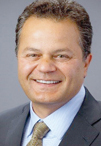
Bahou
First fourteen
Plans call for an initial focus on the manufacture of 14 drugs. While Civica Rx cannot name the 14 generics it will produce, for fear of tipping off competitors, Dr. Rod Hochman, president and chief executive of Providence St. Joseph Health, says Civica Rx will focus initial production on drugs used in hospitals that governing members have identified as being in frequent short supply and/or only available at inexplicably exorbitant prices. Providence St. Joseph is a governing member of Civica Rx.
Elie M. Bahou, Providence St. Joseph chief pharmacy officer, suggested injectable medications used pre- and post-surgery could be on the list of 14. VanTrieste said there already are about 200 generic drugs that meet the criteria for production — essential drugs with unstable supply. These include drugs used on an inpatient and/or outpatient basis. Civica Rx has not yet begun seeking the Food and Drug Administration licenses to manufacture drugs.
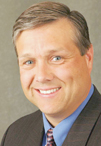
VanTrieste

Fierens
Pure greed
Lou Fierens is executive vice president of administrative services, and Bob Ripley is vice president and chief pharmacy officer, both of Trinity Health, a Civica Rx governing member. Fierens and Ripley explained that, as is the case at the vast majority of hospitals around the U.S., Trinity Health hospitals deal with generic drug supply worries on a daily basis. They said Trinity Health hospitals keep what amounts to a whiteboard list to flag drugs that may run out. Pharmacists, supply chain managers and clinicians work together to replenish inventory and head off disruptions that can impact patient care. They contact wholesalers and try to identify drugs that could be used as substitutes. In rare cases hospital pharmacies compound drugs. Bahou, Dredge and Frost said the situation is the same at their systems.
Ripley said in the 34 years he's been a pharmacist, he's never witnessed the level of market distortion that he's seen in the last several years.
The ministry members who spoke to Catholic Health World said in many cases competitive pressures have reduced the number of producers for individual generic drugs to just a handful, giving those producers pricing power but also limiting their ability to respond nimbly when there is a disruption in their own manufacturing line. Ripley mentioned that in mid-September he got warnings that Hurricane Florence could disrupt production at a major producer of injectable medicines.
While unavoidable production disruptions account for some of the shortages and related price spikes for generics, some of the issues come down to "pure greed" by pharmaceutical producers engaging in monopolistic behavior, said Bahou. He said those bad actors are capitalizing on the power they command as the dominant producers of certain lifesaving drugs.
Different animal
Liljenquist and other representatives of Civica Rx's governing members say the company will have more than one production site for most of the drugs in its pharmacopeia. Production will be geographically dispersed so that if one plant or production line goes offline, another would be able to take up the slack. And long-term contracts with buyers will stabilize demand, reducing downside risk if other drug sellers take drastic price reductions or flood the market with supply, to try to counter Civica Rx's competitive threat.

Ripley
Civica Rx's model is "novel" — the first of its kind, said Dredge.
The model is an industry "disruptor," said Hochman. He said that he came of age in the 1960s — a decade of political activism and disruption of the status quo — and so "I just love this."
Dredge said of the providers involved with the effort, "This is something we all feel passionate about. … We believe all people should have access to the high-quality pharmaceuticals they need and at affordable prices.
"We're protecting the vulnerable" — that is, patients in need of lifesaving drugs — "and they are the ones most exposed to the generic drug (supply) problem," he said.
|
Governing members
The 10 governing members of Civica Rx have donated $1 million each toward startup costs and each is extending what amounts to a $9 million line of credit to Civica Rx. They are:
- Catholic Health Initiatives, the Englewood, Colo.-based nonprofit Catholic health system with 100 hospitals
- HCA Healthcare, the Nashville, Tenn.-based for-profit with 178 hospitals in the U.S. and United Kingdom
- Intermountain Healthcare, the 23-hospital not-for-profit system that is based in Salt Lake City and that spearheaded Civica Rx
- Mayo Clinic, the Rochester, Minn.-based nonprofit with five hospital campuses
- Providence St. Joseph Health, the 51-hospital nonprofit Catholic system based in Renton, Wash.
- SSM Health, the 24-hospital nonprofit Catholic system based in St. Louis
- Trinity Health, the Livonia, Mich.-based Catholic nonprofit with 94 hospitals
- The Laura and John Arnold Foundation, which invests in efforts to improve health care and other social goods
- The Peterson Center on Healthcare, a philanthropy dedicated to advancing high-quality, affordable health care
- The Gary and Mary West Foundation, with funds devoted to improving care, particularly for seniors
(St. Louis-based Ascension was among organizations that had signaled plans to join Civica Rx when the generic drug company was announced in January, but that system has opted not to be a Civica Rx governing member at this time.)
|
|
Civica Rx's pricing may inoculate safety net hospitals
While generic drug shortages can pose a life-or-death threat to vulnerable patients — and while patient safety is the primary focus for ministry providers countering the threat — the shortages also put at risk the financial health of vulnerable hospitals.
That is according to pharmacy experts at Catholic health systems, who told Catholic Health World that the unpredictable and hyperinflated pricing of some essential generic drugs in recent years has been especially hard on safety net hospitals, which operate on thin margins, in some cases putting the hospitals' long-term financial viability at risk.
Civica Rx, a not-for-profit drug company launched to counter capricious price increases and mitigate supply disruptions in the generics market, could provide a cushion against that risk. Craig Frost, Catholic Health Initiatives system vice president of pharmacy operations, said, "We hope to support safety net hospitals and other high-need facilities" through the work of Civica Rx. CHI, Trinity Health, Providence St. Joseph Health and SSM Health are among 10 governing members of Civica Rx.
Bob Ripley, vice president and chief pharmacy officer of Trinity Health, said that in most cases, the generic drug market works as it should, producing stable supplies of high-quality drugs at value pricing for patients who need them. But, he added, in a small segment of the generics market, various distortions have resulted from poor decision-making by drug manufacturers, such as failing to have contingency plans in place for disruptions of the drug manufacturing process, or from monopolistic behavior by manufacturers who restrict supplies of product to drive up prices.
Elie M. Bahou, Providence St. Joseph chief pharmacy officer, said that in cases in which a price-hiked drug is the only acceptable pharmaceutical for use, hospitals have no option but to pay the asking price.
Private payers will reimburse the hospitals for drugs covered by their enrollees' plans and at a rate that is normally somewhat close to what the drug companies have charged the hospitals. Medicaid and Medicare reimburse at a lower amount. In the case of generics with artificially inflated — and exorbitant — prices there is a significant gap between the cost the hospital has paid for a drug and the reimbursed amount. The greater the price distortion, the bigger the shortfall under this payment system, Bahou said. One can see how the situation can wreak havoc on financially strained hospitals, Bahou said.
CHI's Frost said Civica Rx expects to price its drugs below the current market. All purchasers will pay the same fixed price for Civica Rx drugs irrespective of the size of the order. That will benefit safety net hospitals and stand-alone hospitals, that had not been able to get volume discounts, he said.
Lou Fierens, Trinity Health executive vice president of administrative services, noted Civica Rx's governing documents allow for additional considerations for stand-alone safety net hospitals that cannot afford membership in Civica Rx. "We have a pathway to access products without membership" for those financially strained providers. He said they won't have to pay a membership contribution. That one-time contribution normally would have been $300 per licensed bed.
"We're thinking societally," said Ripley.
— JULIE MINDA
|
Copyright © 2018 by the Catholic Health Association
of the United States
For reprint permission, contact Betty Crosby or call (314) 253-3490.